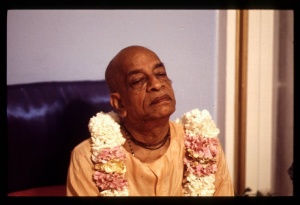SB 8.11.27: Difference between revisions
m (1 revision(s)) |
(Vanibot #0018 edit: make synonym terms in Sanskrit italic in SB - Vanisource) |
||
| Line 1: | Line 1: | ||
{{info | {{info | ||
|speaker= | |speaker=Śukadeva Gosvāmī | ||
|listener=King | |listener=King Parīkṣit | ||
}} | }} | ||
[[Category:Srimad-Bhagavatam - Canto 08 Chapter 11]] | |||
[[Category:Bhagavatam Verses Spoken by Sukadeva Gosvami - Vanisource|081127]] | |||
<div style="float:left">'''[[Srimad-Bhagavatam]] - [[SB 8|Eighth Canto]] - [[SB 8.11: King Indra Annihilates the Demons|Chapter 11: King Indra Annihilates the Demons]]'''</div> | |||
<div style="float:right">[[File:Go-previous.png|link=SB 8.11.26]] '''[[SB 8.11.26]] - [[SB 8.11.28]]''' [[File:Go-next.png|link=SB 8.11.28]]</div> | |||
{{RandomImage}} | |||
==== TEXT 27 ==== | ==== TEXT 27 ==== | ||
<div | <div class="verse"> | ||
nirīkṣya pṛtanāṁ devaḥ | :nirīkṣya pṛtanāṁ devaḥ | ||
parair abhyarditāṁ raṇe | :parair abhyarditāṁ raṇe | ||
udayacchad ripuṁ hantuṁ | :udayacchad ripuṁ hantuṁ | ||
vajraṁ vajra-dharo ruṣā | :vajraṁ vajra-dharo ruṣā | ||
</div> | </div> | ||
| Line 17: | Line 22: | ||
==== SYNONYMS ==== | ==== SYNONYMS ==== | ||
<div | <div class="synonyms"> | ||
''nirīkṣya''—after observing; ''pṛtanām''—his own soldiers; ''devaḥ''—the demigod Indra; ''paraiḥ''—by the enemies; ''abhyarditām''—put into great difficulties or oppressed; ''raṇe''—in the battlefield; ''udayacchat''—took up; ''ripum''—the enemies; ''hantum''—to kill; ''vajram''—the thunderbolt; ''vajra-dharaḥ''—the carrier of the thunderbolt; ''ruṣā''—in great anger. | |||
</div> | </div> | ||
| Line 24: | Line 29: | ||
==== TRANSLATION ==== | ==== TRANSLATION ==== | ||
<div | <div class="translation"> | ||
When Indra, who is known as Vajra-dhara, the carrier of the thunderbolt, saw his own soldiers so oppressed by the enemies on the battlefield, he became very angry. Thus he took up his thunderbolt to kill the enemies. | When Indra, who is known as Vajra-dhara, the carrier of the thunderbolt, saw his own soldiers so oppressed by the enemies on the battlefield, he became very angry. Thus he took up his thunderbolt to kill the enemies. | ||
</div> | </div> | ||
__NOTOC__ | |||
<div style="float:right; clear:both;">[[File:Go-previous.png|link=SB 8.11.26]] '''[[SB 8.11.26]] - [[SB 8.11.28]]''' [[File:Go-next.png|link=SB 8.11.28]]</div> | |||
__NOTOC__ | |||
__NOEDITSECTION__ | |||
Revision as of 07:09, 1 December 2017

His Divine Grace
A.C. Bhaktivedanta Swami Prabhupada
A.C. Bhaktivedanta Swami Prabhupada
TEXT 27
- nirīkṣya pṛtanāṁ devaḥ
- parair abhyarditāṁ raṇe
- udayacchad ripuṁ hantuṁ
- vajraṁ vajra-dharo ruṣā
SYNONYMS
nirīkṣya—after observing; pṛtanām—his own soldiers; devaḥ—the demigod Indra; paraiḥ—by the enemies; abhyarditām—put into great difficulties or oppressed; raṇe—in the battlefield; udayacchat—took up; ripum—the enemies; hantum—to kill; vajram—the thunderbolt; vajra-dharaḥ—the carrier of the thunderbolt; ruṣā—in great anger.
TRANSLATION
When Indra, who is known as Vajra-dhara, the carrier of the thunderbolt, saw his own soldiers so oppressed by the enemies on the battlefield, he became very angry. Thus he took up his thunderbolt to kill the enemies.